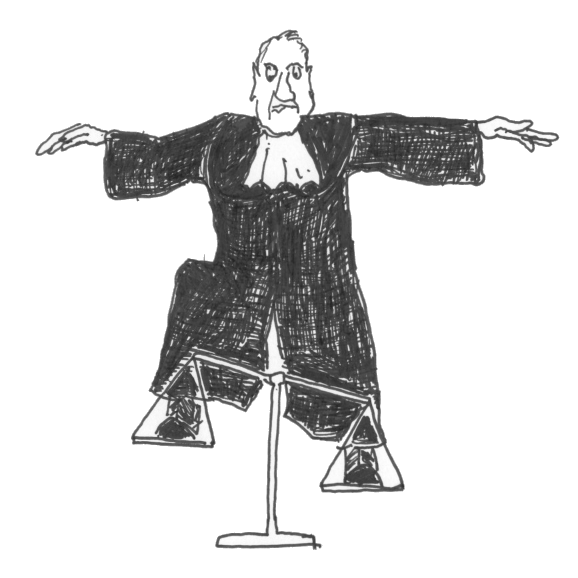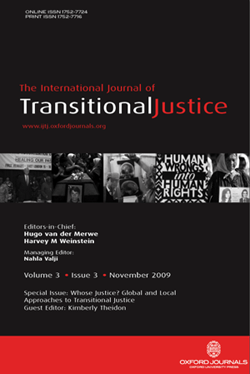 I recently attended the IASFM conference on forced migration outside of Kampala, at a picturesque resort perched above Lake Victoria (yes, there is irony there!). At the conference, numerous scholars presented pieces on “transitional justice” or “TJ”. Disarmament Demobilization and Reintegration (DDR) was “TJ”. Security Sector Reform (SSR) was “TJ”. Forced migration and resettlement, even, was referred to as “TJ”.
I recently attended the IASFM conference on forced migration outside of Kampala, at a picturesque resort perched above Lake Victoria (yes, there is irony there!). At the conference, numerous scholars presented pieces on “transitional justice” or “TJ”. Disarmament Demobilization and Reintegration (DDR) was “TJ”. Security Sector Reform (SSR) was “TJ”. Forced migration and resettlement, even, was referred to as “TJ”.
The term “transitional justice” has salience in describing particular historical periods and dilemmas. It was first used to describe the transitions in Latin America where authoritarian regimes fell, democratic forces took their place and there was a struggle regarding how to achieve justice in the transition from violence to peace. Today, however, “transitional justice” has seemingly lost this specific meaning. Instead, the term is now defined, as per the International Center for (you got it!) Transitional Justice (ICTJ) as:
“a response to systematic or widespread violations of human rights. It seeks recognition for victims and to promote possibilities for peace, reconciliation and democracy. Transitional justice is not a special form of justice but justice adapted to societies transforming themselves after a period of pervasive human rights abuse. In some cases, these transformations happen suddenly; in others, they may take place over many decades.”
Paradoxically, transition is no longer needed for transitional justice!
There is little doubt that transitional justice is developing as a discipline as well as a lens with which to explore and analyze issues of accountability in conflict and post-conflict settings. Transitional Justice now has its very own academic journal, its own center (ICTJ, as above) and numerous “networks” including the London Transitional Justice Network, of which I am a member. However, it is worth considering and indeed questioning whether this is not unproblematic.

Transitional Justice has exploded as an issue in international politics, with various centers dedicated to it, a journal and networks of academics and practioners.
At IASFM Brian Kagoro rather poetically declared that:
“There is no transitional justice in Africa because Africa has always been in a state of transition.”
Kagoro’s off-the-cuff remarks are well worth consideration. In the vast majority of African contexts (which share the brunt of “TJ mechanisms”), there is no real transition. Instead, truth commissions, traditional justice mechanisms, tribunals and the like are instituted during ongoing conflicts. To borrow this blog’s name sake, TJ in Africa is actually “justice in conflict”. Nowhere is this more obvious than with the International Criminal Court. In the cases of Uganda, the Democratic Republic of Congo, Darfur, Libya and the Central African Republic, the ICC has intervened prior to the conclusion of violent political conflicts.
In addition to the typical lack of transition when transitional justice mechanisms are applied, there are numerous reasons to question the appropriateness and effectiveness of the term transitional justice as it is typically applied. As outlined previously, TJ does not identify what the transition it speaks of actually is or the end of transitional justice itself. It also suggests that justice is necessary in transition. This may be so for many but it is certainly not obvious for all – including victims. But the point of this post is not to re-hash these issues again. Instead, it is to question whether something that means so many things – from DDR to forced migration – can really mean anything at all.
In 2001, Roland Paris wrote a piece entitled ‘Human Security: Paradigm Shift or Hot Air?” wherein he questions the utility of the concept of human security, a term developed by the UNDP in the 1990s, which intended to shift the locus of security from states to people. Paris suggested that human security may be a good rallying cry for groups and individuals to do good but its usefulness was limited. It neither gives guidance to policy-makers in a world of competing resources nor to academics because it is too broad as an analytical tool. He wondered if human security, as a concept, was “so vague that it verges on the meaningless” and questioned how an approach “that seems to encompass everything from substance abuse to genocide” could possibly have analytical utility.

The Journal of Transitional Justice is a wonderful source for cutting-edge academia on TJ, but rarely challenges the concept itself.
It is hard not to think of transitional justice, as it is used today, in the same way. How can something that means DDR, SSR, ICC, TRC, forced migration and everything in between actually mean anything at all? Further, the dilution of the term TJ wherein it covers and conflates issues as vastly different as disarmament and criminal justice threatens its utility for policy-makers.
What explains the explosion in the use of the term transitional justice? Much like human security only a few years ago, TJ is now the biggest new idea in international politics. As such, scholars and practitioners are bending the meaning of their work to relate it to transitional justice. That is how we get DDR and forced migrations being transitional justice.
None of this is to say that issues like forced migration, DDR, SSR and so on aren’t about justice. They almost certainly are. Neither is this post intended to imply that the key conflict resolution and post-conflict peacebuilding strategies are not vital. Further, much of the work being done in the field is remarkable and is attracting some of the most gifted scholars in the world.
But transitional justice isn’t simply about justice, perhaps the most inter-subjective notion known to humanity. Transitional justice was intended to mean a particular set of choices and dilemmas facing societies in a particular time-frame. By conflating transitional justice with simple justice, we find ourselves back at square one: where everyone has a different idea of what is just and what is justice and virtually everything can be interpreted to be related to the pursuit of justice.
Transitional justice is the latest sexy term in international politics and everyone wants a slice of that TJ pie. But putting everything related to peacebuilding and all types of justice and post-conflict decision-making under the TJ umbrella risks undermining the value and specificity of the term transitional justice itself.


Very well put. I think many people who write on transitional justice don’t even realise how overstretched the term is. Just yesterday a professor at my university who does not work on the topic asked me why ICC investigations in conflicts are being discussed as transitional justice. And he has a point. If you take the term seriously, it is actually miused in these contexts.
Thanks for the comment Patrick – I thought you might agree!
Perhaps this is the natural evolution of terms such as “human security” and “transitional justice” but I still fear that unless it retains a specific, analytical usefulness to scholars and practitioners, TJ won’t last very long. Confusion, as illustrated by your prof, will catch up and some will begin to undermine the presumed meaning of the concept. It will be interesting to watch this process and see if TJ will sustain itself over the next 5-10 years.